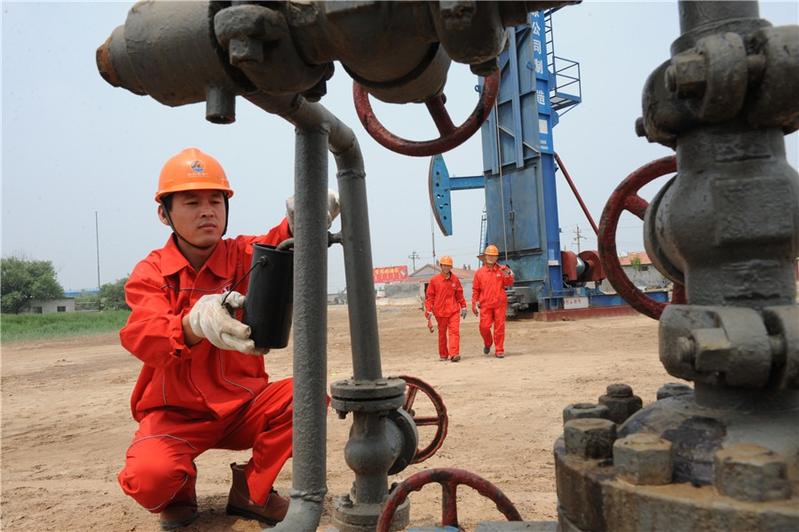 In this undated photo, an employee checks crude oil processing equipment at the Shengli Oil Field in Dongying, Shandong province. (HU QINGMING / FOR CHINA DAILY)
In this undated photo, an employee checks crude oil processing equipment at the Shengli Oil Field in Dongying, Shandong province. (HU QINGMING / FOR CHINA DAILY)
China's oil giants, especially those with major business in upstream sectors including China National Petroleum Corp and China National Offshore Oil Corp, will suffer if oil prices remain at depressed levels throughout the year, said an industry expert.
"The low oil price will benefit companies like China Petrochemical Corp (Sinopec) whose business is mainly downstream, as the refining sectors will benefit," said Li Li, research director at energy consultancy ICIS China.
"However, companies including CNPC and CNOOC, who focus on the upstream sector, will be under pressure ... which will be more obvious in the second quarter," Li said.
While costs of production are largely fixed, large and capital-intensive drilling operations will be hit harder than smaller rigs under such circumstances, which can shut down temporarily and then restart once prices rise
While costs of production are largely fixed, large and capital-intensive drilling operations will be hit harder than smaller rigs under such circumstances, which can shut down temporarily and then restart once prices rise.
Downstream companies will not be hit as hard since they profit by purchasing crude oil and selling the refined products at a premium. Their profit margins should remain fairly stable even with fluctuating crude oil prices.
Oil prices have plummeted to multiyear lows as the price war between major oil producers Saudi Arabia and Russia continues. Oil demand is also collapsing as the spread of the coronavirus pandemic looks increasingly serious, said Goldman Sachs in a research note.
ALSO READ: Oil falls on scepticism over Trump's proposed output deal
CNPC, the country's largest oil and gas producer, reported expansion in revenue in 2019, which rose 6 percent year-on-year to 2.52 trillion yuan (US$355.22 billion), while net profit saw a sharp drop of 45.68 billion yuan, down 13.9 percent from the previous year.
The exploration and production sector, the brightest spot, generated a 30.7-percent increase in profit, according to the company's annual financial report.
It said the performance was within expectations as major production indicators grew steadily despite the complex and grim situation of the global oil market affected by the gloomy economic outlook and sharp decline in oil prices.
The company has been affected by the pandemic, which helped produce a drastic drop in refined oil demand and slower growth for natural gas. The weaker crude prices have also hurt the group's revenue and profit, it said.
Facing challenges arising from intensifying downward economic pressure and the further collapse in oil prices, the company vowed to uphold innovative strategies and promote high-quality development.
READ MORE: Global oil market is broken, drowning in crude nobody needs
Sinopec, the country's largest oil refiner, also saw its bottom line decline in 2019, with net profit attributable to shareholders standing at 57.59 billion yuan, down 8.7 percent year-on-year, and total operating revenue coming in at nearly 2.97 trillion yuan, up 2.6 percent year-on-year.
CNOOC reported a net profit of 61.05 billion yuan last year, a 15.9 percent rise, its best performance in five years, thanks to higher oil and gas output and persistent cost controls. Revenue reached 233.2 billion yuan, up 2.4 percent over 2018.
All the oil and gas giants said they would implement more stringent cost controls and more prudent investment decisions as the coronavirus outbreak increases global economic uncertainty amid sharp oil price falls.
S&P Global Platts Analytics has adjusted its 2020 global oil demand growth outlook down to 860,000 barrels per day, marking the weakest forecast since 2011. Asian refined products demand is expected to grow by 380,000 b/d in 2020, "posting its weakest growth since the global financial crisis in 2009", Platts said.
While the low crude prices put Sinopec under less pressure compared with the other two oil and gas giants, the intense competition and excess production capacity of the downstream sector in the country makes its situation not that pleasant, Li said.


